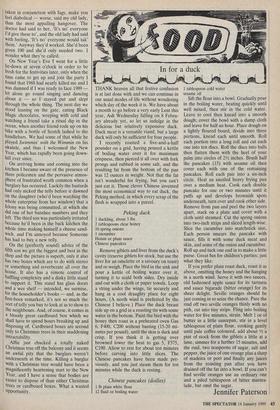THANK heaven all that festive confusion is at last done
with and we can continue in our usual modes of life without wondering which day of the week it is. We have about a month to go before a very early Lent this year, Ash Wednesday falling on 8 Febru- ary already yet, so let us indulge in the delicious but relatively expensive duck. Duck meat is a versatile viand, but a large duck will only be sufficient for four people.
I recently roasted a five-and-a-half pounder on a grid, having poured a kettle of boiling water over it for maximum crispness, then pierced it all over with fork prongs and rubbed in some salt, and the resulting fat from the bottom of the pan was 12 ounces in weight. Not that the fat isn't wonderful for frying, but you can't just eat it. Those clever Chinese invented the most economical way to eat duck, the Peking method, in which every scrap of the flesh is wrapped into a parcel.
Peking duck
1 duckling, about 5 lbs 2 tablespoons clear honey 16 spring onions 1 cucumber Hoisin or plum sauce Chinese pancakes
Remove giblets and liver from the duck's cavity (reserve giblets for stock, but use the liver for an omelette or a savoury on toast) and re-weigh. Place the bird in the sink and pour a kettle of boiling water over it, turning it to scald both sides. Dry inside and out with a cloth or paper towels. Loop a string under the wings, tie securely and hang in a cool draughty place for eight hours. (A north wind is preferred by the Chinese I believe.) Place the duck breast side up on a grid in a roasting tin with some water in the bottom. Paint the bird with the honey then roast in a preheated oven Gas 6, F400, C200 without basting (15-20 mi- nutes per pound), until the skin is dark and crisp. If you think it is getting over browned lower the heat to gas 5, F375; C190. Allow to rest for about ten minutes before carving into little slices. The Chinese pancakes have been made pre- viously, and you just steam them for ten minutes while the duck is resting.
Chinese pancakes (doilies) 1 lb plain white flour
12 fluid oz boiling water 1 tablespoon cold water sesame oil
Sift the flour into a bowl. Gradually pour in the boiling water, beating quickly until well mixed, then stir in the cold water. Leave to cool then knead into a smooth dough; cover the bowl with a damp cloth and leave for half an hour. Place dough on a lightly floured board, divide into three portions, knead each until smooth. Roll each portion into a long roll and cut each one into ten discs. Roll the discs into balls then flatten them with the heel of your palm into circles of 21/2 inches. Brush half the pancakes (15) with sesame oil then cover each with one of the remaining pancakes. Roll each pair into a six-inch circle. Heat an unoiled heavy frying pan over a medium heat. Cook each double pancake for one or two minutes until it puffs up and develops brownish spots underneath, turn over and cook other side. Remove from pan and peel the two layers apart, stack on a plate and cover with a cloth until steamed. Cut the spring onions into two-inch strips and sliced length-wise. Slice the cucumber into matchstick size, Each person smears the pancake with sauce, fills it with some duck meat and skin, and some of the onion and cucumber. Roll up and tuck one end in to make a little purse. Great fun for children's parties; just what they like.
If you prefer plain roast duck, roast it as above, omitting the honey and the hanging in a north wind. Serve it with two sauces, old fashioned apple sauce for its tartness and sauce bigarade (bitter orange) for its sheer delight. Seville oranges should be just coming in so seize the chance. Pare the rind off two seville oranges thinly with no pith, cut into tiny strips. Fling into boiling water for five minutes, strain. Melt 1 oz of butter in a little saucepan, stir in a level tablespoon of plain flour, cooking gently until pale coffee coloured, add about 1/2 a pint of stock from the giblets a little at a time, simmer for a further 15 minutes, add the rind, two teaspoons of sugar, salt and pepper, the juice of one orange plus a slurp of madeira or port and finally any juices from the roasting pan after you have drained off the fat into a bowl. If you can't find seville oranges use an ordinary one and a piled tablespoon of bitter marma- lade, but omit the sugar.
Jennifer Paterson


















































 Previous page
Previous page